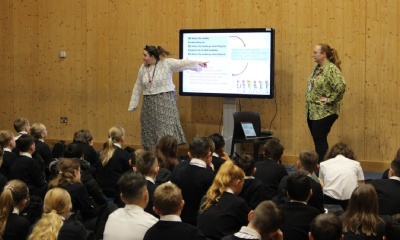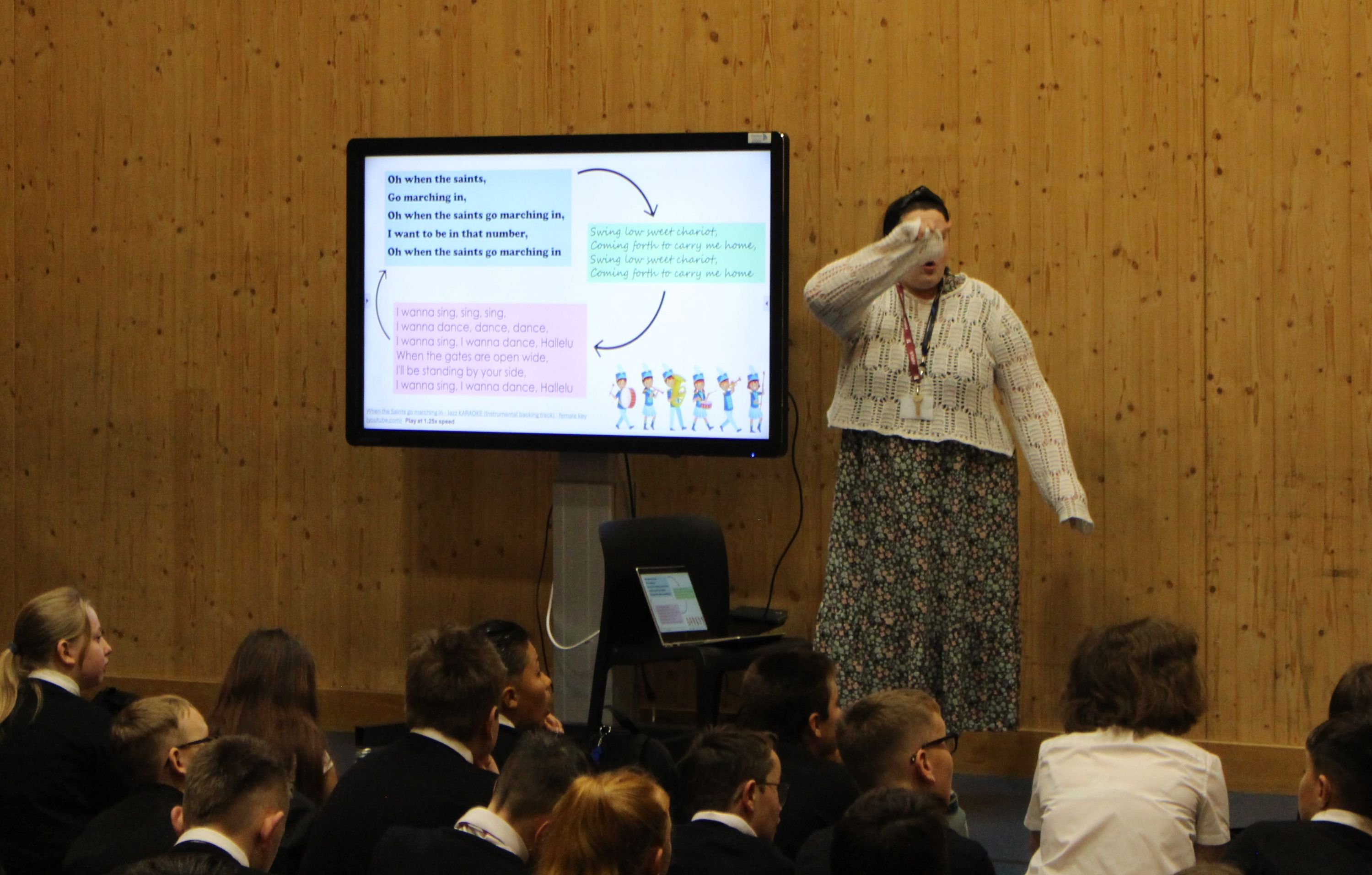Emily Chamberlain shares her vision for Creative Arts

"Our primary goal is for students to feel confident and energised when performing, embracing it as an act of wellbeing."
Emily Chamberlain, Head of Creative Arts at The Wisbech Academy, brings a wealth of experience and passion to her role. With a background in Performing Arts and a journey that includes teaching and leadership roles, Emily's path has led her back to Wisbech, where she's excited to inspire students through music and the arts. We recently caught up with Emily to learn more about her vision for music education and her reflections on the recent ‘International Day of Music’ celebrations at the Academy…
Emily, can you share a bit about your journey in the arts and education? What led you to this role as Head of Creative Arts?
I’ve always been passionate about the arts, which led me to pursue a BA (Hons) in Performing Arts and a PGCE in Secondary Education (Drama). My background in Musical Theatre and Physical Theatre has shaped my teaching and performance career. I started teaching English and Drama in Northeast England and spent seven years as Head of Drama and Acting Director of Music at an OFSTED outstanding girls’ school in London. There, I honed my leadership skills, facilitated research and development groups, and contributed to the Creativity Collaborative, a nationwide Arts Council project aimed at integrating creativity across all subjects to enhance student engagement and learning. Being part of this initiative, which partnered with the National Theatre and Durham University, was incredibly rewarding and is something I am very proud of.
Growing up in the Fens, returning to my community has been deeply fulfilling, allowing me to work closely with young people and be nearer to my family.
What do you hope students take away from their music education here?
At The Wisbech Academy, I’m really proud that we’re known as a ‘singing school.’ Music is a huge part of what we do, covering everything from performing and composing to musicology. I hope students will fall in love with music and appreciate different cultures, genres, and styles. Plus, music helps with memory, attention, and problem-solving, which benefits other subjects too.
I want students to have a rich and fulfilling experience with music. Our approach encourages them to explore their talents, work in teams, communicate well, and express themselves confidently. We aim to build their creativity, innovation, and cultural awareness, preparing them for a successful future. Creating a supportive environment where students feel safe to take risks and express themselves is key. We also focus on technical skills and expressive performance, making their work engaging and impactful. Encouraging creativity and curiosity is important, as I want students to ask questions, try new ideas, and seek diverse musical experiences. Promoting independent practice helps them become resilient and autonomous musicians.
Overall, we hope that these experiences will make them better musicians and well-rounded individuals. Plus, we’re always looking to add super-curricular opportunities like concerts, choirs, instrumental ensembles, and cross-curricular projects to get students involved and excited about music.
What activities took place on October 1st, for the ‘International Day of Music’?
During International Music Day 2024, we had a blast with various activities. We started with a special singing assembly, featuring “Blackbird” by Paul McCartney, which was written in response to the Civil Rights movement, to honour Black History Month. We also did a fun mash-up of “Oh When the Saints,” “Swing Low Sweet Chariot,” and “Sing!” with lots of enthusiasm.
Throughout the week, students learned about sonority and created soundscapes inspired by train stations. Classes 7A and 7B were the first of our cohort to enjoy free peripatetic flute and clarinet lessons, provide by TWA through Cambridgeshire Music. Some students also performed with our TWA choir at the open evening, and they’re excited for more rehearsals and performances.
How do you think celebrating this day impacted the students' love for music?
Celebrating International Music Day was a true celebration of our school’s love for music. The special singing assembly and fun activities, like the mash-up performance, made music feel exciting and accessible. I strongly believe that everyone can sing, and this event really helped boost our students’ confidence in their singing abilities!
Our students were thrilled to get involved with the free flute and clarinet lessons, as well as the choir performances. These hands-on experiences likely sparked even more interest and enthusiasm for music. Overall, it was a fantastic way to show them how fun and enriching music can be, while also building their confidence in performing.
How did you encourage students to participate and share their musical talents on this day?
We made our singing assembly a celebration of community and the joy of music. It was fun and relaxed, focusing on students enjoying themselves. We incorporated some singing techniques and taught them how the voice works and the basics of making a great sound. Our primary goal was for students to feel confident and energised when performing, embracing it as an act of well-being and a celebration of their talents and skills.
We also have a strong performing culture in lessons. Our students are brave and always perform, even when they’re nervous, which helps boost their confidence. During our Music lessons for the week, we explored sonority and soundscapes. Students composed and performed soundscapes inspired by train stations, which was a fantastic way for them to share their creativity and musical talents.
What are your plans for inspiring students to engage with music and creative arts at TWA?
We’re super excited to kick off our new super-curricular program, packed with lots of amazing opportunities for our students. These activities are designed to not only boost their progress in lessons but also help them grow personally.
In our Music program, we’re setting up a choir and an instrumental ensemble, giving students plenty of chances to perform throughout the year. We’re also planning to introduce a school production in Drama, which will be a fantastic way for students to showcase their talents. Plus, we’ve got some great trips to theatres and concerts in mind to expand their horizons in the performing arts.
On top of that, we’re hoping to bring in professional musicians, actors, and artists to meet with our students. This will give them a chance to learn about developing their skills and what life in the creative arts is really like. Through these initiatives, we hope to inspire our students to dive deep into the creative arts and develop a lasting appreciation for their value.
What advice would you give to students interested in pursuing a career in the creative arts?
If you’re thinking about a career in the creative arts, being a creative mind is crucial. But even more important is spending time now developing your resilience and autonomy. Many careers in the creative arts are self-driven, so you’ll need to be resilient when facing challenges and have the determination to keep going and make things happen for yourself. It’s all about being able to bounce back from setbacks and having the independence to push your projects forward. And remember, not all creative arts jobs are performance or artist-based; there are plenty of roles with a focus on STEM, project management, literary work, and a wide variety of other areas!

